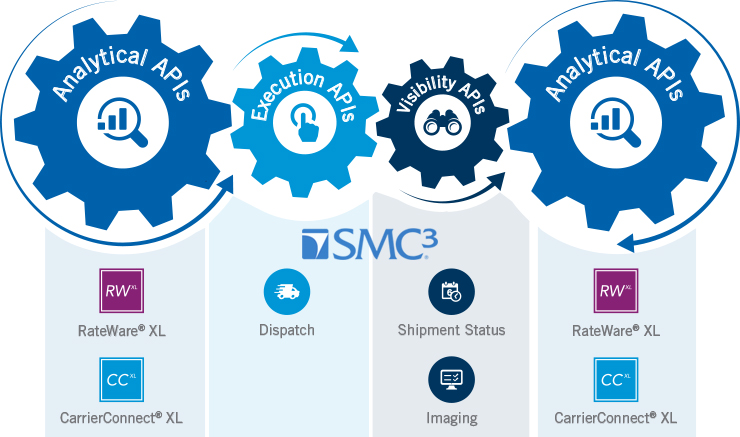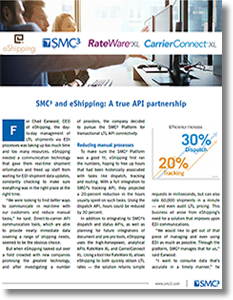Pros and Cons of Supply Chain Transactional APIs versus EDI Logistics Communication Technologies

Much of the market is weighing the pros and cons of transactional APIs versus EDI communications, but these messages must be coupled with high-speed analytical solutions that allow shippers and 3PLs to perform rating and transit-time analysis and audit to truly optimize their logistics network.
Transactional APIs versus EDI Communications
Representatives from carriers, shippers, and 3PLs – basically, anyone who works in the supply chain at all – knows electronic data interchange (EDI) messaging has long been the standard way to communicate among logistics stakeholders.
And while it is a legacy technology, EDI messaging is so entrenched in the supply chain that companies trumpeting the refrain “EDI is dead” are getting ahead of themselves.
Application Programming Interfaces or APIs are actually not a new phenomenon, and some technology companies have used more robust forms of APIs – tools built for analysis and optimization – in their solutions for years.
But the emergence of direct-to-carrier transactional APIs has led some companies providing these messages to call for a complete rejection of EDI.
While APIs might allow shippers and 3PLs new ways of communicating with their partners, a lot of the industry is still hesitant to embrace this messaging as the only way to do business.
The industry is slow to change, and shippers, especially larger retailers and manufacturers with deeply rooted processes, don’t see making the switch from EDI as a priority. Shippers will be the ones to determine the health of EDI communications, and until they determine it’s a smart business move to make the switch, the status quo regarding EDI will remain.
That doesn’t mean API communications aren’t prevalent. In fact, SMC³ uses APIs as the foundation of many of its products.
According to a recent American Shipper study, “In many ways, APIs are an evolutionary improvement on the standard EDI message sets the freight transportation industry has long leaned on. Companies on all sides that have invested in EDI integrations aren’t necessarily prioritizing the replacing of those integrations with APIs - yet.”
American Shipper also found that the majority of shippers surveyed are “somewhat satisfied with EDI,” a finding that further underlines the fact that switching from EDI to APIs isn’t a priority.
Simply put, reports of the death of EDI have been greatly exaggerated.
No single technology solution can provide all the answers. While transactional freight APIs solve many problems, they aren’t a panacea; they should be used in combination with other technologies as part of an overall shipment optimization strategy.
EDI technology won’t leave the market for years, but EDI isn’t right for some shippers. Along the same lines, transactional APIs might not work for other shippers.
Much of the market is weighing the pros and cons of transactional APIs versus EDI communications, but these messages must be coupled with high-speed analytical solutions that allow shippers and 3PLs to perform rating and transit-time analysis and audit to truly optimize their logistics network.
Companies that offer a range of technology solutions can support shippers’ needs as they grow, whether the shipper is dealing with 10 shipments or 10,000 shipments per day.
The optimal technology provider should know its way around the industry and have a proven track record of safeguarding users’ data, adapting with changing supply chain demands and, of course, serving customers well.
EDI and APIs are simply forms of messaging, and supply chain success really boils down to finding a partner with a holistic technology solution for supply chain optimization.
Download the related resources below and learn how SMC³ execution and visibility APIs go beyond simple connectivity while providing real-time shipment communications to shippers, carriers, 3PLs and technology providers.
Related Resources
Why eShipping Selected the SMC³ Platform for Transactional LTL API Connectivity
In this SMC³ case study, Chad Earwood, CEO of eShipping, describes how they integrated the SMC³ platform for transactional LTL API connectivity, and by using the high-horsepower, analytical APIs RateWare XL and CarrierConnect XL they are able to obtain immediate LTL rates and even audit LTL pricing. Download Now!
Transportation APIs & the SMC³ Platform
These data sheets detail how the SMC³ Platform offers the only transportation APIs designed to go beyond simple connectivity to deliver service orchestration for logistics service providers, shippers, carriers, and technology providers. Download Now!
The Single Source for LTL Pricing & Transit Information
The SMC³ Platform empowers 3PLs and Shippers of any size to successfully navigate and optimize the LTL shipment arena, choose the level of computing power based on your specific needs and operating environment with a technology platform offering the best of all worlds. Download Now!
More Resources from SMC³
Article Topics
SMC3 News & Resources
SMC3 Mercury Gate Case Study - Improving Workflows and Enhancing Efficiency with LTL APIs SMC3: Is Technology a Competitive Advantage in the Modern Supply Chain Industry? Armada’s Prather examines the disconnect between the freight economy and the macro economy at SMC3 JumpStart 2024 SMC³’s Solution to the Logistics Industries Talent Problem 2024 Transportation Rate Outlook: More of the same? Refining LTL API Consumption for Optimal Efficiency and Enhanced Services Regulations Impacting Less-than-Truckload More SMC3Latest in Technology
Spotlight Startup: Cart.com is Reimagining Logistics Walmart and Swisslog Expand Partnership with New Texas Facility Taking Stock of Today’s Robotics Market and What the Future Holds Biden Gives Samsung $6.4 Billion For Texas Semiconductor Plants Apple Overtaken as World’s Largest Phone Seller Walmart Unleashes Autonomous Lift Trucks at Four High-Tech DCs Talking Supply Chain: Procurement and the AI revolution More Technology

















